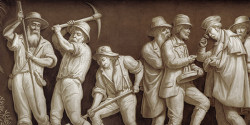Subscribe: RSS
We dig into the Copyright Royalty Board’s decision on new royalty payments for internet radio, looking for clues about the future of small and medium-sized webcasters.
In our final review of the 20th anniversary of the Telecom Act of 1996, Matthew Lasar explains how the Act and the political environment of the time affected community and public radio. Then Jennifer Waits tells the second half of the story behind Haverford College’s longstanding radio history.
Finally, Paul and Eric examine the hyperbolic headlines declaring that SoundCloud is dying, and put it in historical perspective. Spoiler alert: don’t store your digital legacy on any single platform.
By popular demand we want to turn the Radio Survivor Podcast into a weekly radio program for any non-commercial radio station to broadcast, free of charge. We need your support to do this.
We need to bring our Patreon fundraising campaign to $500 a month to have the necessary resources to make this show broadcast-ready every week. If every listener gave just $1 a month we would reach that milestone in no time. Please see our support page for more details.
Subscribe: RSS
Show Notes
- Will Performance Royalties Create a New Class of Radio Pirate?
- LPFM Watch: How Internet Radio Royalty Rates Affect Low-Power Stations
- Podcast #34 – How the Telecom Act of ’96 Triggered Popular Resistance
- Podcast #33 – 20 Years Ago Local Radio Was Crushed
- Jennifer’s Talk at Haverford – Dig into the Archives: The Secret 90+ Year History of College Radio at Haverford (Feb. 23, 2016 event)
- Haverford College’s Radio Heydey in the 1920s
- Haverford on the Radio article from Haverford Magazine
- College Radio’s Hidden History (radio in the 1920s)
- WHRC



